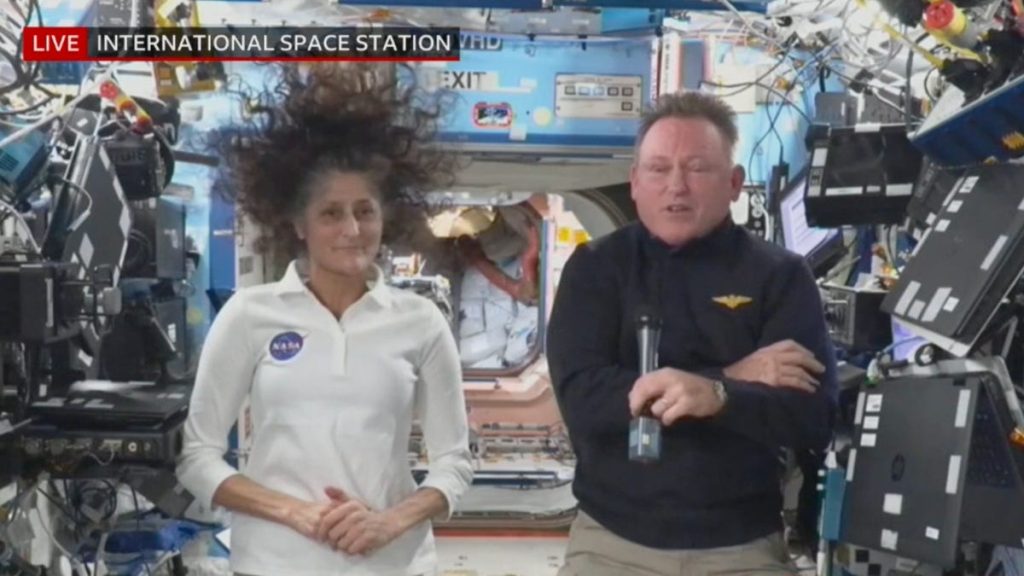Astronauts Sunita “Suni” Williams and Barry “Butch” Wilmore’s eight-day mission to the International Space Station (ISS) aboard the Boeing Starliner has unexpectedly extended into a months-long stay, leading them to celebrate Christmas in orbit. Initially scheduled to return to Earth in February, their return has been postponed to late March 2025 due to delays in the preparation of the SpaceX Dragon spacecraft that will transport them and two other astronauts back home. This delay is necessary to ensure the new Dragon spacecraft is fully operational and ready to carry the next crew rotation to the ISS. While unforeseen, Williams and Wilmore have embraced their extended stay, engaging in various scientific studies and maintenance work alongside their fellow astronauts. Their Christmas celebration in space, complete with festive decorations and holiday cheer, has generated curiosity and even some lighthearted conspiracy theories on social media.
The unusual circumstance of Williams and Wilmore’s prolonged mission stemmed from technical issues with the Starliner spacecraft. While the spacecraft successfully docked with the ISS in June after overcoming helium leaks and thruster malfunctions, the extended stay became necessary to accommodate the delayed preparation of the return vehicle. The Starliner represents Boeing’s contribution to NASA’s Commercial Crew Program, aimed at providing reliable transportation to and from the ISS. However, compared to SpaceX’s Dragon spacecraft, which has completed numerous successful missions, the Starliner has faced significant technical challenges, impacting its reliability and schedule. The decision to extend Williams and Wilmore’s mission was made after careful evaluation by NASA and SpaceX, prioritizing both crew safety and the ongoing scientific objectives of the ISS.
The astronauts’ adaptation to their extended mission has been remarkably positive. Both veterans with extensive experience in space, Williams and Wilmore have expressed their enjoyment of life in orbit, emphasizing the peaceful environment and the unique experience of contributing to scientific research in a microgravity setting. They have actively participated in over 60 scientific studies during their stay, ranging from botany experiments to data analysis. Their positive attitude and dedication to their mission have been commended by NASA, assuring the public of their well-being despite concerns raised about their appearance in recent photographs. Regular health monitoring and individualized fitness regimes ensure the astronauts’ physical and mental health throughout their extended stay.
Addressing public curiosity regarding the presence of Christmas decorations on the ISS, NASA confirmed that the festive items were delivered in late November via a SpaceX resupply mission. Regular deliveries of supplies, including food, equipment, and personal items, ensure the astronauts have access to necessary resources and maintain a sense of normalcy during their long-duration missions. The inclusion of holiday decorations serves to boost morale and allow the crew to celebrate traditions even while far from home. This practice of sending festive items highlights the importance of supporting astronauts’ psychological well-being during extended space missions.
The resupply missions, while crucial for sustaining life on the ISS, are not without occasional challenges. A recent delivery brought with it an unexpected odor, prompting temporary closure of a section of the station. However, NASA quickly addressed the issue, ensuring the air quality returned to normal levels and posing no threat to the crew’s health. Another area of public concern has been the astronauts’ perceived weight loss in recent photographs. NASA officials have reassured the public that the astronauts’ weight is regularly monitored and remains within healthy parameters, attributing any apparent changes to the effects of microgravity on the human body.
Williams and Wilmore’s extended mission underscores the complexities of space travel and the adaptability required of astronauts. Their commitment to their duties, their positive outlook, and their ability to embrace the unexpected highlight the dedication and resilience of individuals contributing to space exploration. As they continue their work on the ISS, their experience serves as a testament to the human capacity for adaptation and the pursuit of scientific advancement even in the challenging environment of space. The delayed return underscores the evolving nature of space missions and the ongoing collaboration between NASA and private sector partners like SpaceX and Boeing to ensure safe and efficient space travel.

